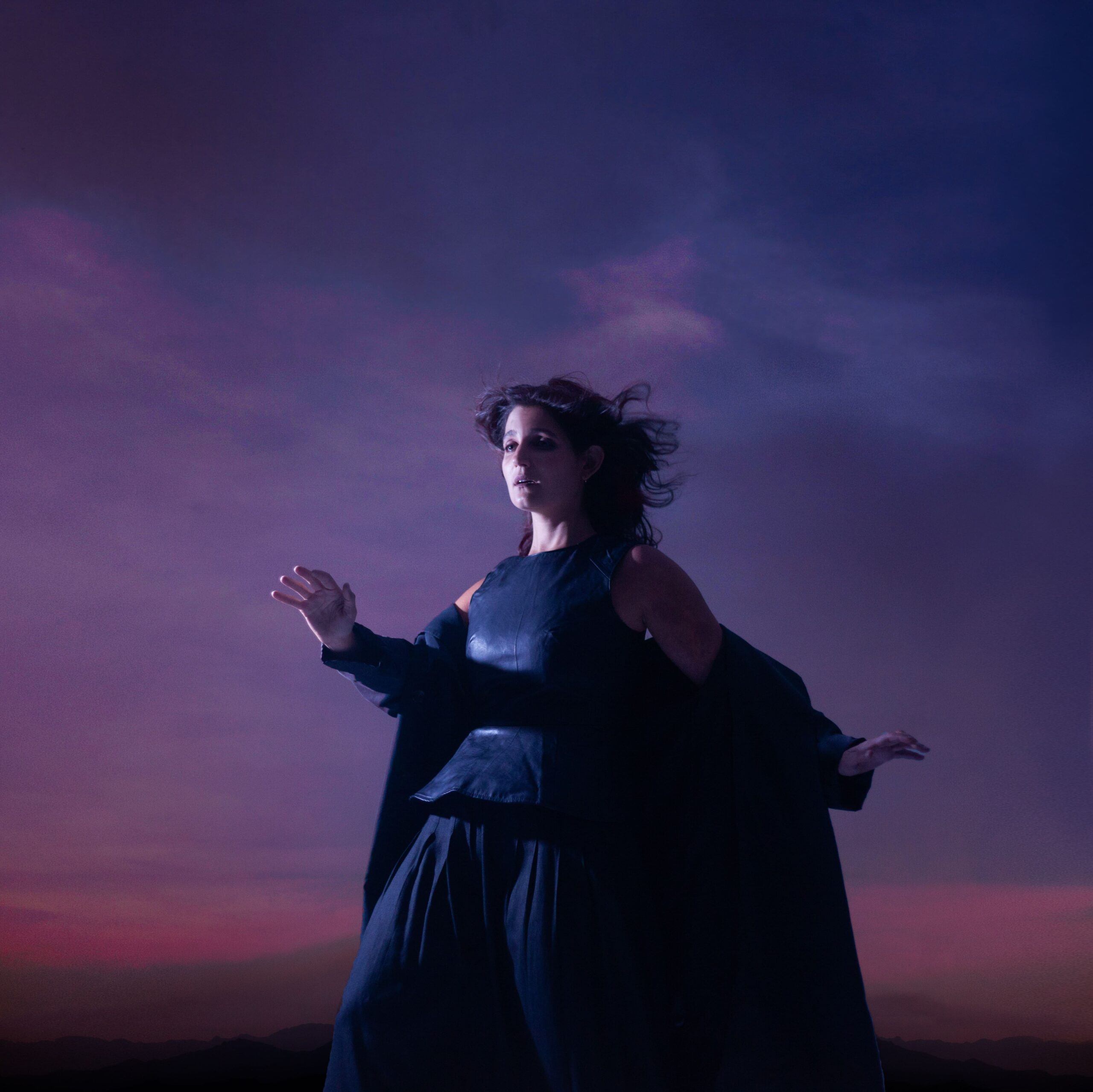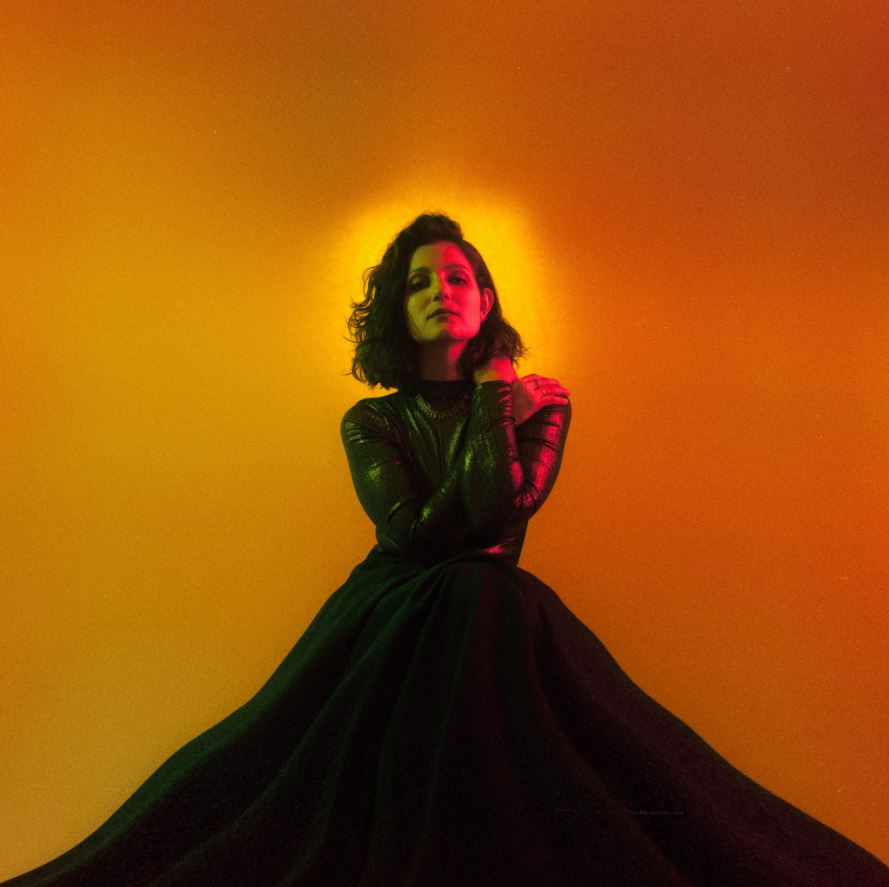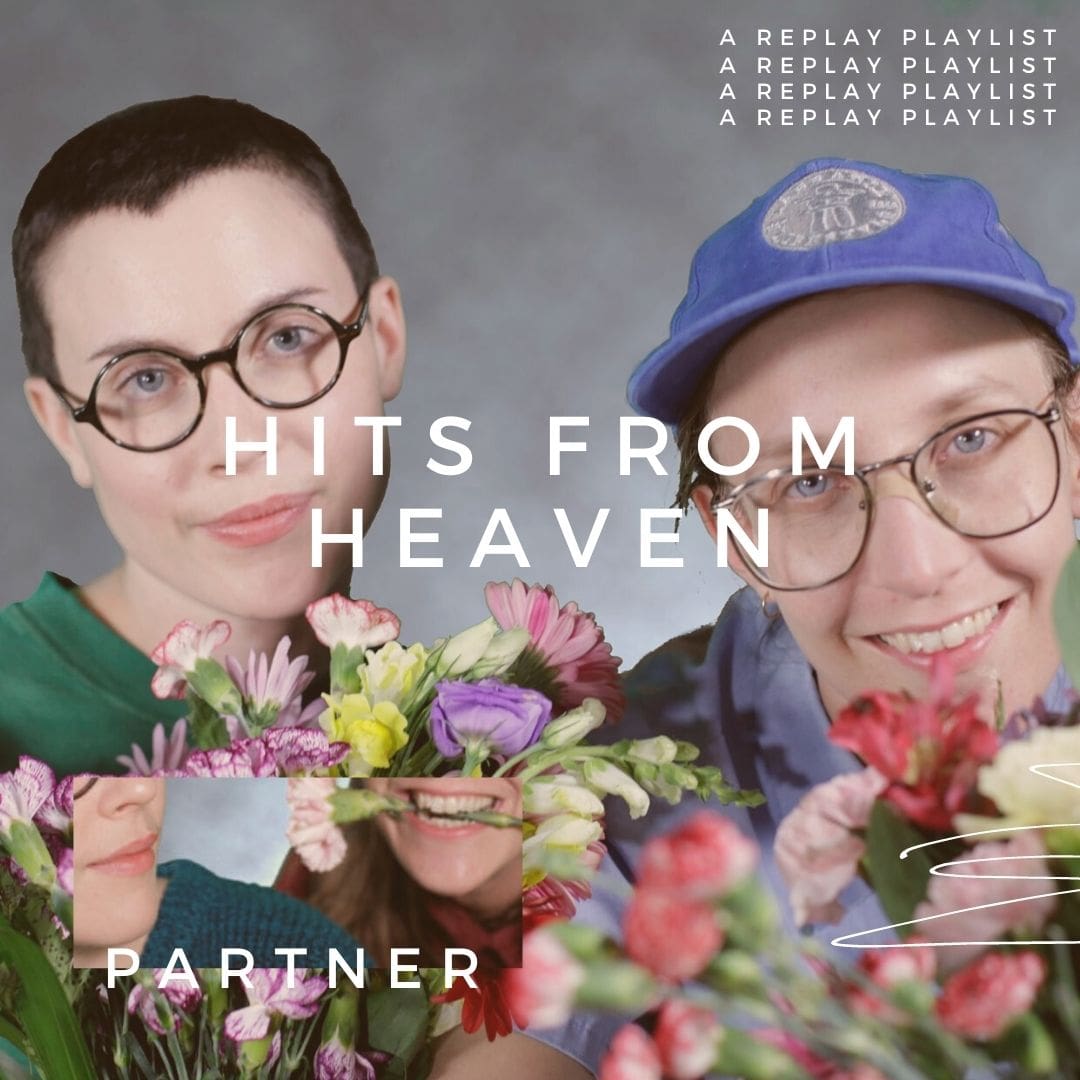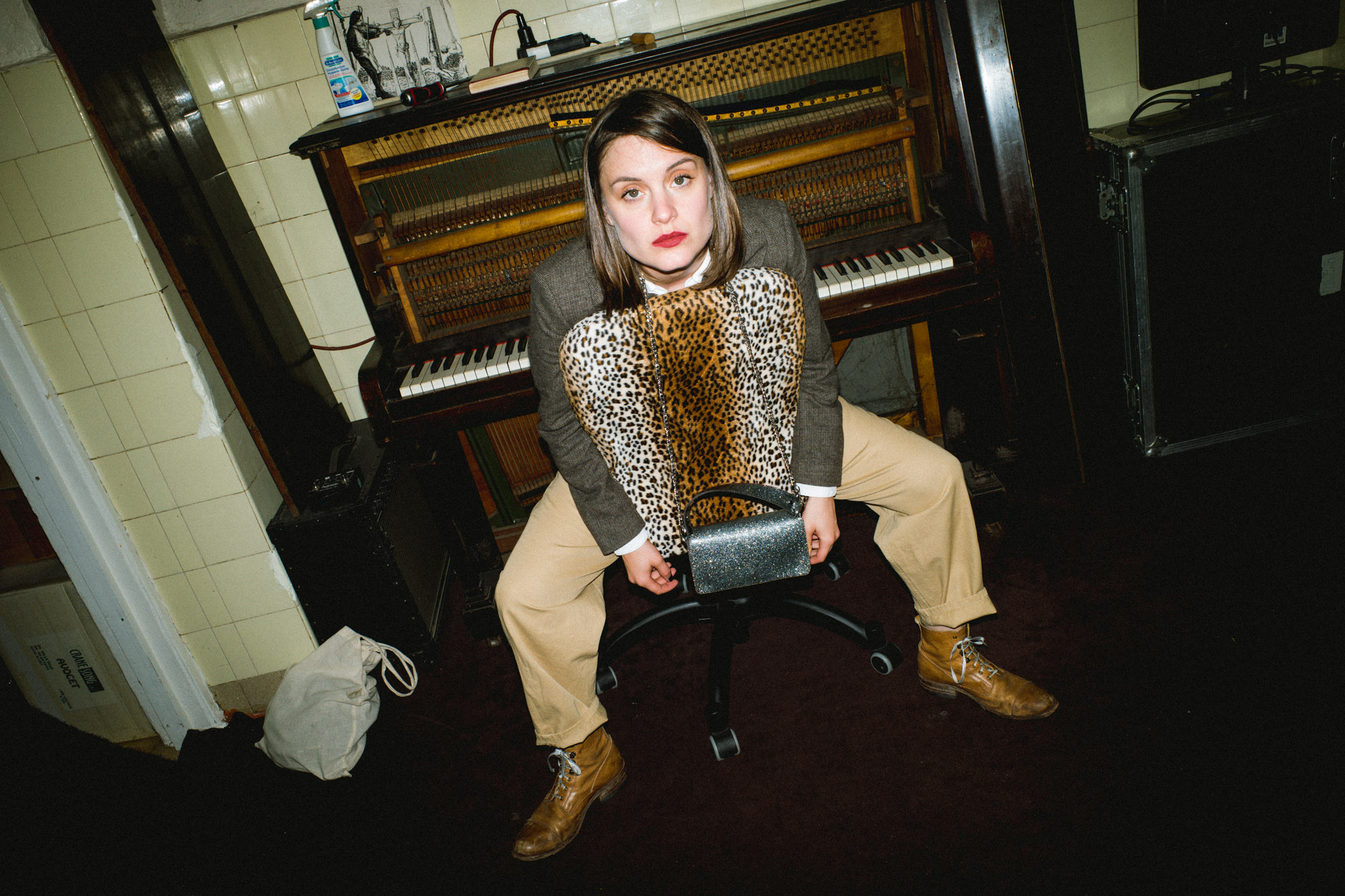Raia Was is a New York-raised and based songwriter, pianist, vocalist, and producer. She’s an evocative songwriter with an ethereal, experimental, soulful sound, whose Autre Ne Veut-produced record Angel I’m Frightened is set to drop in May 2021 (Side A of which was released in September 2019). Raia’s work explores themes and imagery of secrecy, doubling, intimacy, contradictions, and more, and she and I (who, full disclosure, know each other personally) sat down recently to discuss her record and dig into those themes. Read our conversation, below.
This interview has been condensed and edited throughout.
Slumber: You set up an installation performance piece for the release of your single “I Can’t Reason.” [Note: I was at that performance.] Can you describe that installation and performance?
Raia Was: The space is called Conveyor. And it’s run by a good friend of mine, Andrew Sheron, who made these incredible enormous glass [panels] that we used to make a box, almost like a display case, that I was in and performed a 15-minute song cycle on loop for an hour [in], to be interfaced with, like an installation, which was my first time doing anything like that. It was super challenging, just durationally for me, but I really wanted to present a performance that changed the dynamic of what audiences were supposed to… do, you know, and to have there be no rules, to have it start as people come in, before people come in, they can come in and out, they can walk around. [To] sort of take away the rules of stage and audience separation and just let myself go through something and let the audience bear witness, which is increasingly becoming a theme in my thoughts on performance and also on music making.
Slumber: While you were in this structure, there was also a reflection of you on the glass, and reflection and echoing and doubling is something that comes up in your album. What inspires you to incorporate these elements of reflection and echoing into your work?
RW: I think it’s an apt way to visualize how making this record and writing this record felt for me in my mind. I felt like there was a lot that I wanted to say from a lot of different angles. And I found myself saying things that came in direct contradiction to each other, writing entire songs that contradicted each other and that kept secrets from one another… mirroring and doubling feels like a theme that I’m hashing out sort of in real time. The second show that I did for the second single [off of Side A], I had a body double with me who didn’t perform, but stood. I had an electronic station and a station at the piano, and she stood as a shadow in whatever space I left, and we were dressed identically. And it was so cool to feel her presence and to feel what that does to me and then how I perform from that place. It really brings me back to how I felt making the record and performing it.

Slumber: Do you think that that idea of the shadow self or the multiple self speaks to the subject matter that you’re dealing with on the record as well? [The] idea that most people have multiple sides or multiple selves present in their one person?
RW: Yeah, totally. Totally. The record for me is made from and sort of sits in the inner monologue. And I think that’s the place where we make a lot of decisions about who we are, where we hear ourselves think and hear ourselves say things and feel like, huh, [we] surprise ourselves. And like a very sort of private place where we make choices that’s right on the cusp of the people we end up showing [to the world]. And we, I think more often than not, only show one version of ourselves at a time and for extended periods of time, and when we think about people changing we think about them changing over a long swaths of time, which is true. But I also think you change from moment to moment and even hold all the ways that you are not in every one way you decide to be, and all those things that you don’t do and all the versions of yourself that you don’t embody at a given moment still inform the one person you’re showing at a time.
Slumber: Makes sense.
RW: Yeah?
Slumber: Yeah, absolutely. I had this college professor who used to say that everybody’s, you know, self is really tied up in the narrative that they’re telling about themselves at any given time. And I feel like that idea really comes through in your album. And in addition to that, there’s the idea of sort of becoming that other person or becoming another kind of lover, as you do literally say in one of your songs [“Some Other Kind of Lover”]. So what informs that aspect of it, of officially becoming that other person in addition to, or is maybe separate from, the deep shadow self or reflective self?
RW: I think I was trying stuff on particularly Side A, the songs on Side A are really burdened and are trying to find space to breathe. And I think, through this sort of like mantra mania, like circular thinking, I’m just trying to find a way to be and…characters are experimenting with how that is going to happen, which is something I feel myself doing in life. I think I am someone who tries on ideas first and before enacting anything, I really picture it and live in it in my head. And I think in “Some Other Kind of Lover,” that’s really happening to that character. A lot of the lyrics are quite assertive in that song, but I don’t always believe them, which is something I’m interested in, like…The little lies, not malicious lies, [but] the little lies that are also a part of our identity and narrative building.
“...it’s really hard to integrate how our world is changing from moment to moment, and sort of like a teenager is like elbowing at the walls, you know, like we’re rebelling against the structure of the concept of reality.”
Slumber: Do you think that the performance we all put on of maybe showing different versions of ourselves at different moments in time, is that in some way a little bit of a lie?
RW: I think it’s a lie if you’re too consistent. I think it’s an exciting part of being human, to [for example] see people with their family and see how their body language changes and see how their face changes. And I don’t think it’s a bad thing, but I do think it’s a difficult thing to reconcile. In the times we’re living in, where the world in truth feels very confusing and people who are keeping the world in a state of untruth, it feels so intentional. And it’s sad to me to think that the answer to that has to be, you know a sort of steadfast consistency where[as], art I think is about wiggling. So in art, how do we react to the sort of unstable ground of truth and identity and personhood that is really sort of an affront, attacking our daily lives? I, as an artist, really want to be able to lie and that to be okay if it’s for a good reason, you know?
Slumber: Do you think lying like that could almost be a form of growth or change?
RW: Yeah. I also think it’s a way of understanding how what’s around us could even be happening. I think if you’re too honest about your ideas of reality, it’s really hard to integrate how our world is changing from moment to moment, and sort of like a teenager is like elbowing at the walls, you know, like we’re rebelling against the structure of the concept of reality. I think it is totally about growth, yeah.
Slumber: The way you’ve constructed this [album] feels very much like the old days of vinyl or cassettes where you have a Side A, you have a Side B, they do feel of a piece, but they also feel very distinct in tone and sound. What inspired you to format the record this way and why [are] Side A and Side B where [they are]?
RW: Most of the songs were written pretty much side-by-side. And after having enough distance from finishing the record and taking a step back, that [Side A and Side B] division became clear. Actually, my first instinct was to let them mingle and to make a record that ebbs and flows with that dichotomy, sort of, like side-by-side. But after starting to perform the record more, I really started to feel that it had to be presented as separate so that that contrast could really be felt. And it surprised me once I separated them how distinct [they are]….It’s an interesting thing to see myself do that, I wasn’t necessarily intending to do [it]. And it helped me think about the frame of mind I was in and what I was thinking about and why [it] may have come out that way….And it was an exciting thought to imagine having one way of presenting A that was fully committed and then having a different way of presenting B that’s also fully committed.

Slumber: Do you feel like Side B is meant to build on Side A, or are they building on each other, or are they kind of in conversation? How do you view these two pieces?
RW: Many of the songs are in direct conversation with their counterpart on the other side. “Reprise,” though it’s on Side A, is actually a reference and came after writing the first track of Side B and uses, quotes musically, the backing vocal of that song on Side B, and is sort of an answer to the scenario set up in “You Are.” And also “I Was Here to Stay” feels really in conversation with “I Can’t Reason.” They create an evenness and a reason for their extremes by each other’s existence. But as a whole, I think that they’re different kids to me.
Slumber: Distinct.
RW: Yeah.
Slumber: It’s pretty meta, I think, that in this dual album of Side A, Side B, you’re also dealing with themes of duality. And so I want to hear a little bit from you about the dualities you were thinking about when you were writing this album and what are those dichotomies that maybe inspired you?
RW: I was thinking a lot about secrets. Secrets from ourselves, secrets in relationships, blind spots and…writing with the blinders on and seeing the world as if you didn’t know otherwise. And I think that leads to a sense of duality from the outside looking in. I don’t know that I was thinking about duality in writing it. [That’s come up] more in experiencing it and being a little surprised at what I’ve said. It feels like it has to be about that experiment of, what it’s like when you pretend things are one way and you really aren’t seeing the whole picture and you let the secret be a secret and you put it somewhere else and then deal with that in another song. It unfolded… in that way that I think becomes about duality. And then honestly, in thinking about how to present it, it made me feel like a little devious to have said so many things in so many different ways that feel like in stark contradiction. And then I started thinking about that, like why does that make me feel that way? And that’s, I think, sort of how I was able to zoom out and eventually feel like, huh, I did a thing on this record and what it’s doing makes me uncomfortable and seems pretty demonstrative of my state of mind.
“I don’t feel optimistic... about how the record ends. I feel like there’s closure, but I also feel like it will make sense that there’s more music. And for me, that doesn’t come out of optimism.”
Slumber: Do you think that maybe one of the messages that comes out of that is that it’s okay to live in this contradiction? It’s okay to have these secrets?
RW: I hope so. I think if you’re not hurting anyone, secrets are great. And I think that secrets, like you were saying with growth, if you’re able to suspend your disbelief about yourself in different ways I think it leads to growth. And I think it’s a good practice to be in.
Slumber: Moving a little bit more into Side B, there’s this kind of sense of clarity that comes in parts of Side B. I’m thinking specifically of this kind of quiet piece and then a crescendo in “Go,” and then the whole of “Restart.” Does that feel accurate to you that that’s what it’s putting out there?
RW: One hundred percent. For me “Restart” is the most frank and direct, looking really directly at the listener and saying something without filter that’s maybe the most…zoomed out and isn’t, you know, a tiny detail and isn’t burdened and isn’t sort of stoic and isn’t cold. It’s sort of like the clearest statement. And it’s also the last track of the record. And it’s also a new beginning. It’s a kind of open-ended track.
Slumber: Do you feel like “Restart” therefore ends the album in a kind of optimistic place?
RW: I think it ends the album with closure. I don’t feel optimistic about, about how the record ends. I feel like there’s closure, but I also feel like it will make sense that there’s more music. And for me, that doesn’t come out of optimism.
Slumber: Just like keep doing the work, keep making the music, keep listening to the music, that kind of thing?
RW: Sure, yeah…I don’t know, I don’t think in happy endings, so I’d rather just sort of end where you started and that be okay. That we took a long journey just to kind of come back to the beginning or come back to point A.
Slumber: Maybe there’s something about restarting the cycle where you learn new things on the second time around or the third time around or the fourth time around. Do you feel like that was sort of at play when you were putting this together?
RW: For me? Totally. I think where I’m writing from now, writing for the next record, I am exactly where I started, but so different. And I think that may just be who I am as an artist, which is a good thing to know. And I think if you’re inquisitive enough that that’s okay, and new things will come from taking a pass at the same circle.
Slumber: Kind of like you can be in the same place, but you could be a different person or be a different version of yourself at that time. Having learned so much and go from there and keep growing and building.
RW: Exactly.
Slumber: How do you see this album as building on your previous work?
RW: It feels like its own beast…I mean, I made this record in the cover of night while performing other music with another band and knew that I wasn’t going to be making this record with that band and knew that I wasn’t going to be able to perform this record with that band. This record was like a thing I needed to do. It started really as an experiment of going to an older me. A me that had become a little less curated in my sound and a little less stylized, but something more primal. I was making it from a really sort of manic place and it’s so…different. But that’s…that is where I make music from now. Always. So I think it may just also have been a big career shift and it’s really freed me to make music from that place.
Listen to Side A of ‘Angel I’m Frightened’ ahead of Side B’s release on May 7th:


